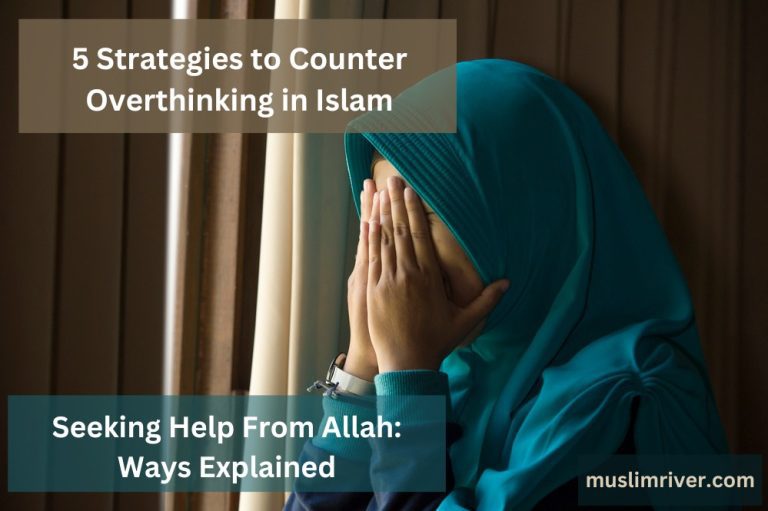Mastering Dhikr: Techniques and Daily Practices
Do you struggle to maintain a consistent Dhikr practice, feeling overwhelmed by daily demands and unsure how to integrate this spiritual discipline effectively into your busy lives?
So if you are missing out on the profound peace and spiritual growth that a structured Dhikr routine can offer, the gap between intention and action can leave you feeling disconnected and spiritually stagnant.
So my guide will walk you through the importance of dhikr manners, steps to perform dhikr, dhikr phrases & building a weekly, daily routine to fit into your schedule, making it easier than ever to find tranquility in your daily routine.
So unlock the spiritual power of Dhikr transform your days & connect deeply with your faith, enhance your spiritual well-being, and integrate meaningful practices into your busy life.
Embrace a journey of peace and fulfillment today!
Each section is designed to provide structured learning, directly addressing common challenges and paving the way for a disciplined and enriched spiritual journey.

The Importance of Manners in Dhikr
In Islam, the essence of Dhikr lies not just in the repetition of phrases but in the profound engagement of the soul with its Creator.
So it’s crucial to recognize the role of Adab, or spiritual etiquette, in enhancing our connection with Allah.
In this section, I will walk you through the significance of dhikr, its mindfulness & common mistakes to avoid fostering a soulful dialogue with our Creator, grounded in respect and understanding.
So you will be able to elevate your spiritual practice with sincerity and mindful devotion to truly experience the transformative power of Dhikr.
1. Significance of (Dhikr) Adab: Approaching Dhikr with the right Adab is essential.
It’s about more than following rituals; it’s about preparing your heart to be present and receptive.
This spiritual state of readiness elevates your practice, making each phrase more than a recitation—it becomes a profound expression of your love and longing for Allah.
2. Respect and Mindfulness: The phrases of Dhikr are sacred, each carrying deep meanings and divine wisdom.
To truly honor what we recite, it’s vital to understand and respect these meanings.
Mindfulness in Dhikr involves being fully present, allowing the words to resonate within our hearts and minds, thus deepening our spiritual awareness and connection.
3. Common Mistakes to Avoid: Even with the best intentions, there are common pitfalls in practicing Dhikr without proper Adab.
Rushing through recitations, losing focus, or merely repeating words without contemplation can diminish the spiritual benefits.
By cultivating a disciplined approach—pausing to reflect on the meanings and maintaining a tranquil setting—we can avoid these mistakes and enrich our spiritual journey.
Ensure yourself you are not making these mistakes while doing dhikr.
To get complete information about manners & their importance, please check: Manners to Perform Islamic Dhikr & Their Importance in Islam
In embracing these practices with empathy and encouragement, we open ourselves to a more profound, fulfilling experience in our daily Dhikr.
Let’s commit to this beautiful spiritual discipline, enhancing our lives with its peace and wisdom.
Next, we’ll explore the “5 steps guide to perform an individual Dhikr,” providing practical tips to elevate your spiritual journey.
How to Perform Individual Dhikr: 5 Steps Guide
Are you going through your day feeling disconnected, rushed, and spiritually unfulfilled without a clear and accessible method, the essence of Dhik?
I will provide you with a structured yet flexible approach such as preparation, prayers, choosing dhikr phrases, recitation techniques to integrate Dhikr into your daily routine, ensuring you can achieve tranquility and a deeper connection with Allah.
So you can transform ordinary moments into extraordinary opportunities for spiritual growth and peace.
Forge a closer connection with Allah in the quiet moments of your day.
Here’s a simple, heartfelt guide to help you embrace this beautiful practice with ease and sincerity.
Step 1: Preparation — Finding a Serene Place and Setting the Right Intention.
Begin by finding a quiet and comfortable spot where you won’t be disturbed.
Sit in a position that allows you to be relaxed yet alert. As you settle in, clear your mind and set your intention—remind yourself that you are here to connect with Allah, seeking His pleasure and closeness.
The Holy Quran emphasizes,
إِنَّنِىٓ أَنَا ٱللَّهُ لَآ إِلَـٰهَ إِلَّآ أَنَا۠ فَٱعْبُدْنِى وَأَقِمِ ٱلصَّلَوٰةَ لِذِكْرِىٓ ١٤
Tranliteration: Innanee ana Allahu lailaha illa ana faAAbudnee waaqimi assalatalithikree
— TransliterationTranslation: ‘It is truly I. I am Allah! There is no god ˹worthy of worship˺ except Me. So worship Me ˹alone˺, and establish prayer for My remembrance.
Source: Surah Taha – 14 – Quran.com
Step 2: Starting with Prayer — Begin with a Prayer or Seeking Forgiveness to Purify the Heart.
Initiate your Dhikr session by softly reciting a prayer or seeking Allah’s forgiveness.
This act purifies your heart, setting a humble tone for your practice, and opens your spirit to the divine grace and mercy that Dhikr brings.
Step 3: Choosing Dhikr Phrases — Select Phrases that Resonate Personally, Focusing on Their Meanings Choose Dhikr phrases that speak to you personally; it could be the simple yet profound “SubhanAllah,” “Alhamdulillah,” or “Allahu Akbar.”
Reflect on their meanings deeply, as this understanding will enhance the impact of your recitation and help integrate their significance into your daily life.
In Quran Allah states,
يَـٰٓأَيُّهَا ٱلَّذِينَ ءَامَنُوا۟ ٱذْكُرُوا۟ ٱللَّهَ ذِكْرًۭا كَثِيرًۭا ٤١
O believers! Always remember Allah often,
Ya ayyuha allatheena amanooothkuroo Allaha thikran katheera
Surah Al-Ahzab – 41 – Quran.com
Step 4: Recitation Techniques — Discuss Voice Modulation, Pacing, and Counting Methods.
Recite your chosen Dhikr phrases with focused attention.
Modulate your voice to a level that helps maintain concentration—whether silently or audibly.
Maintain a steady pace; rush neither the words nor the breath.
Counting on your fingers or using prayer beads can help keep track of your repetitions, grounding your practice in a rhythm that soothes the soul.
Step 5: Closing the Session — Conclude with Gratitude and Supplication As you end your session, express your gratitude to Allah for the opportunity to engage in Dhikr.
Conclude with a heartfelt supplication, asking Allah to accept your efforts and to continue guiding and enlightening your path.
Anas bin Malik narrated that: the Prophet said: “The supplication is the essence of worship.”
Want to overcome these typical hurdles, such as losing focus, inconsistency, and overcomplicating Dhikr Practice?
To ensure your Dhikr becomes a powerful tool for personal and spiritual growth please read: 5 Steps to Perform Islamic Dhikr For Inner Peace.
Remember, Dhikr is not just a practice but a gateway to tranquility and spiritual fulfillment. Each phrase you utter is a seed planted in the garden of your soul, nurtured by your sincerity and love.
These steps connect directly to the broader goal of enhancing your individual Dhikr practice, making it more meaningful and integrated into your everyday life.
Now, explore essential dhikr phrases for daily recitation to make your dhikr journey simpler & consistent
Essential Dhikr Phrases for Daily Recitation
In the hustle of our daily lives, it’s easy to feel disconnected from our spiritual roots.
However, incorporating Dhikr into our routines can be a gentle yet powerful way to reconnect.
I will talk about the dhikr phrases to offer before meals, for forgiveness, for protection, for stress so that it can help you stay spiritually aligned throughout your day.
By repeating these phrases, you tap into the immense strength and mercy of Allah, helping you feel safe and supported.
Each comes with profound benefits that can enrich your life in unexpected ways.
1. Dhikr Before Meals
PHRASE: بِسْمِ اللهِ (BISMILLAH) – “IN THE NAME OF ALLAH.”
Starting your meal with “Bismillah” is a beautiful reminder that every blessing, including our food, comes from Allah.
The Prophet Muhammad (peace be upon him) said:
If any one of you intends to eat, let him say: ‘Bismillah’ (In the name of Allah). If he forgets to say it, then let him say: ‘Bismillah awwalahu wa aakhirahu’ (In the name of Allah, at its beginning and at its end).
This simple phrase helps us practice mindfulness and gratitude with every bite, turning a daily habit into a spiritual act.
2. Dhikr for Forgiveness
PHRASE: أَسْتَغْفِرُ اللهَ (ASTAGHFIRULLAH) “I SEEK FORGIVENESS FROM ALLAH.”
“I seek forgiveness from Allah” is a powerful phrase to weave throughout your day.
It’s a reminder of our human imperfections and the mercy of Allah. Reciting Astaghfirullah helps cleanse the heart, wash away guilt, and renew our intent to live rightly.
As we reflect on our actions and seek forgiveness, we are also reminded in the Quran:
وَٱلَّذِينَ إِذَا فَعَلُوا۟ فَـٰحِشَةً أَوْ ظَلَمُوٓا۟ أَنفُسَهُمْ ذَكَرُوا۟ ٱللَّهَ فَٱسْتَغْفَرُوا۟ لِذُنُوبِهِمْ وَمَن يَغْفِرُ ٱلذُّنُوبَ إِلَّا ٱللَّهُ وَلَمْ يُصِرُّوا۟ عَلَىٰ مَا فَعَلُوا۟ وَهُمْ يَعْلَمُونَ ١٣٥
˹They are˺ those who, upon committing an evil deed or wronging themselves, remember Allah and seek forgiveness for their sins—and who forgives sins except Allah?—and they do not knowingly persist in wrongdoing?
3. Dhikr for Protection
PHRASE: أَعُوذُ بِاللَّهِ مِنَ الشَّيْطَانِ الرَّجِيمِ (A’UDHU BILLAHI MIN ASH-SHAYTAN IR-RAJIM) TRANSLATION: “I SEEK REFUGE IN ALLAH FROM THE ACCURSED DEVIL.”
This phrase is a spiritual shield, used when facing doubt, fear, or temptation. It reminds us that we are not alone in our struggles—Allah is always a refuge.
The Prophet Muhammad (peace be upon him) taught us to say this phrase particularly when we feel anger brewing (Bukhari).
أَعُوذُ بِاللَّهِ مِنَ الشَّيطَانِ الرَّجِيمِ، وَاتْفُلْ عَلَى يَسَارِكَ (ثلاثاً)
A`ūdhu billāhi minash-shayṭānir-rajīm.
(Say: ) I seek refuge in Allah from Satan the outcast (then blow with a little spittle to your left). (Do this three times reciting in Arabic.)
Source: Hisn al-Muslim 138 – Fortress of the Muslim (Hisn al-Muslim) – حصن المسلم – Sunnah.com – Sayings and Teachings of Prophet Muhammad (صلى الله عليه و سلم)
By invoking Allah’s protection, we fortify our spiritual defenses and clear our minds of negative thoughts.
4. Dhikr for Stress and Anxiety
PHRASE: لا حَوْلَ وَلا قُوَّةَ إِلا بِالله (LA HAWLA WA LA QUWWATA ILLA BILLAH) “THERE IS NO POWER AND NO STRENGTH EXCEPT WITH ALLAH.”
Source: The Meaning of La hawla wala quwwata illa billah | Ep. 6 | Deeper into Dhikr with Dr. Omar Suleiman
In Quran Allah says:
وَلَوْلَآ إِذْ دَخَلْتَ جَنَّتَكَ قُلْتَ مَا شَآءَ ٱللَّهُ لَا قُوَّةَ إِلَّا بِٱللَّهِ ۚ إِن تَرَنِ أَنَا۠ أَقَلَّ مِنكَ مَالًۭا وَوَلَدًۭا ٣٩
If only you had said, upon entering your property, ‘This is what Allah has willed! There is no power except with Allah!’ Even though you see me inferior to you in wealth and offspring,
In moments of stress and anxiety, this Dhikr serves as a profound reminder of our reliance on Allah’s strength over our own.
It’s a declaration of surrender and trust in Allah’s plan, which can be immensely comforting.
This phrase teaches us that no matter the circumstances, our ultimate support and strength come from Allah alone, providing a deep sense of peace and stability.
And if you want to know how dhikr can cope up with stress, regulate your emotions & help you overcome anxiety please read: Topic 6 “Dhikr: Stress Relief, Emotional Regulation, and Overcoming Anxiety”
Each of these phrases carries a light that can brighten your day and strengthen your connection with Allah. By regularly reciting them, you allow your heart to remain in a state of remembrance, filled with peace and gratitude.
To get a complete list of dhikr phrases for spiritual mindfulness, protection, and purification please read on: Essential Islamic Dhikr Phrases for Spiritual Connection
May these words be a comforting companion on your journey through life.
Lets explore next how to build a daily and weekly dhikr routine.
Building a Daily and Weekly Dhikr Routine
Ever find yourself overwhelmed by distractions just as you start your Dhikr routine?
In this section I will talk how you can build your dhikr routine by starting small, making habits, setting trigger points & using resources.
So that you can enrich your life with spiritual nourishment and peace.
Here’s a friendly guide to help you seamlessly integrate this beautiful practice into your life, filled with grace and ease.
1. Start Small and Consistently — The Prophet Muhammad (peace be upon him) said,
Narrated `Aisha: The Prophet (ﷺ) was asked, “What deeds are loved most by Allah?”
He said, “The most regular constant deeds even though they may be few.” He added, ‘Don’t take upon yourselves, except the deeds which are within your ability.”
Inspired by this, begin with small, manageable segments of Dhikr. It might be just a few minutes in the morning or evening.
The key is consistency; ensure that no matter how busy or tired you are, you keep this spiritual appointment with yourself.
It’s the little steps that pave the way to significant spiritual growth.
2. Integrate Habits — A practical tip to make Dhikr a natural part of your day is to stack it onto habits you already have.
For example, reciting Dhikr after each prayer or while doing daily chores.
This method ensures that Dhikr becomes intertwined with your regular activities, making it less likely to be forgotten.
The Quran mentions,
فَٱذْكُرُونِىٓ أَذْكُرْكُمْ وَٱشْكُرُوا۟ لِى وَلَا تَكْفُرُونِ ١٥٢
Fathkuroonee athkurkumwashkuroo lee wala takfuroon
remember Me; I will remember you. And thank Me, and never be ungrateful.
This gentle reminder can help motivate you to keep your heart and tongue engaged in Dhikr.
3. Set Trigger Points — Setting trigger points throughout your day for Dhikr can profoundly enhance your spiritual practice.
Choose specific, routine moments—such as before meals, after prayers, or while commuting—to remind yourself to engage in Dhikr.
These triggers help turn everyday activities into opportunities for spiritual reflection and connection with Allah, seamlessly integrating Dhikr into your daily life and ensuring you maintain a consistent practice.
4. Introduce a Downloadable Resource or App — To help maintain your Dhikr routine, consider using a digital tool.
Apps or downloadable resources can be invaluable for tracking your progress and reminding you of your Dhikr sessions.
This modern approach to traditional practices can enhance your consistency and help you see the tangible progress of your spiritual commitments.
If you want to master the dhikr & build a daily and weekly routine please read: 5 Steps to Build a Daily & Weekly Dhikr Routine: Strengthen Your Faith & learn effective strategies to identify Dhikr trigger points and foster a deeper spiritual connection.
By weaving Dhikr into the fabric of your daily life, you create a rhythm of remembrance that keeps your heart awake and alive to the divine presence.
It’s not just about uttering words; it’s about filling your moments with meaningful reflections that draw you closer to Allah.
Reflect on what felt right, what could be improved, and make small, thoughtful adjustments. This habit will empower you to take active control over your spiritual growth.
Frequently Asked Questions
1. What Is Allah’s Favourite Dhikr?
The best Dhikr is to say, “SubhanAllahi wa bihamdihi, SubhanAllahil-Azeem” (Glory to Allah and His is the praise, Glory to Allah, the Great).
For more information please watch: Easy Dhikr for Extensive Reward – Mufti Menk
This simple, yet powerful Dhikr, combines praise and glorification of Allah, which is beloved to Him as it involves praising His Majesty and acknowledging His perfection.
2. How Can I Fit Dhikr Into a Busy Daily Schedule?
Integrating Dhikr into a busy schedule can be done by associating it with daily habits. For instance, recite Dhikr while commuting, waiting in line, or during breaks at work.
Dhikr does not require a specific time or place and can be performed alongside daily tasks without formal rituals.
This flexibility allows you to maintain constant remembrance of Allah throughout the day, keeping your heart engaged even during mundane activities.
3. What Happens if You Say Astaghfirullah 100 Times a Day?
Reciting “Astaghfirullah” (I seek forgiveness from Allah) 100 times a day has profound spiritual benefits.
The Prophet Muhammad (peace be upon him) emphasized that saying Astaghfirullah regularly purifies one’s heart and brings Allah’s forgiveness and mercy.
Ibn Umar said: “In one sitting of the Messenger of Allah (ﷺ), one could count that he said a hundred time, before he would get up: ‘O my Lord, forgive me, and accept my repentance. Verily, You are the Oft-Returning, the Most Forgiving (Rabbighfirlī watub `alayya innaka antat-Tawwābul-Ghafūr).’”
It can also alleviate burdens and provide a means of sustenance. The continuous seeking of forgiveness helps to clear away the effects of sins and increase spiritual purity.
Conclusion
As we conclude our journey through “Mastering Dhikr: Techniques and Daily Practices,” let’s remember the transformative power of Dhikr.
This simple yet profound practice of remembering Allah not only enriches our spiritual life but also anchors us with peace and gratitude in our daily routines.
Starting small and staying consistent are key—each word of Dhikr is a seed planted for spiritual growth and closeness to Allah.
I encourage you to take these steps, no matter how modest, and share your experiences to inspire and uplift others.
Together, let’s build a supportive community that thrives on mutual encouragement and spiritual development.
May your hearts find peace and your spirits resilience through regular Dhikr. Ameen.






